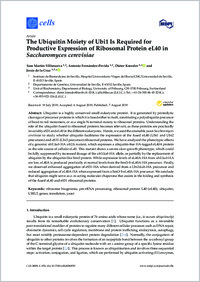The ubiquitin moiety of ubi1 is required for productive expression of ribosomal protein el40 in saccharomyces cerevisiae
- Martín-Villanueva, Sara Instituto de Biomedicina de Sevilla, Hospital Universitario Virgen del Rocio/CSIC/Universidad de Sevilla, E-41013 Seville, Spain - Departamento de Genética, Universidad de Sevilla, E-41012 Seville, Spain
- Fernández-Pevida, Antonio Instituto de Biomedicina de Sevilla, Hospital Universitario Virgen del Rocio/CSIC/Universidad de Sevilla, E-41013 Seville, Spain - Departamento de Genética, Universidad de Sevilla, E-41012 Seville, Spain
- Kressler, Dieter Unit of Biochemistry, Department of Biology, University of Fribourg, CH-1700 Fribourg, Switzerland
- Cruz, Jesús de la Instituto de Biomedicina de Sevilla, Hospital Universitario Virgen del Rocio/CSIC/Universidad de Sevilla, E-41013 Seville, Spain - Departamento de Genética, Universidad de Sevilla, E-41012 Seville, Spain
-
01.08.2019
Published in:
- Cells. - 2019, vol. 8, no. 8, p. 850
English
Ubiquitin is a highly conserved small eukaryotic protein. It is generated by proteolytic cleavage of precursor proteins in which it is fused either to itself, constituting a polyubiquitin precursor of head-to-tail monomers, or as a single N-terminal moiety to ribosomal proteins. Understanding the role of the ubiquitin fused to ribosomal proteins becomes relevant, as these proteins are practically invariably eS31 and eL40 in the different eukaryotes. Herein, we used the amenable yeast Saccharomyces cerevisiae to study whether ubiquitin facilitates the expression of the fused eL40 (Ubi1 and Ubi2 precursors) and eS31 (Ubi3 precursor) ribosomal proteins. We have analyzed the phenotypic effects of a genomic ubi1∆ub-HA ubi2∆ mutant, which expresses a ubiquitin-free HA-tagged eL40A protein as the sole source of cellular eL40. This mutant shows a severe slow-growth phenotype, which could be fully suppressed by increased dosage of the ubi1∆ub-HA allele, or partially by the replacement of ubiquitin by the ubiquitin-like Smt3 protein. While expression levels of eL40A-HA from ubi1∆ub- HA are low, eL40A is produced practically at normal levels from the Smt3-S-eL40A- HA precursor. Finally, we observed enhanced aggregation of eS31-HA when derived from a Ubi3∆ub-HA precursor and reduced aggregation of eL40A-HA when expressed from a Smt3-S-eL40A-HA precursor. We conclude that ubiquitin might serve as a cis- acting molecular chaperone that assists in the folding and synthesis of the fused eL40 and eS31 ribosomal proteins.
- Faculty
- Faculté des sciences et de médecine
- Department
- Département de Biologie
- Language
-
- English
- Classification
- Biological sciences
- License
-
License undefined
- Identifiers
-
- RERO DOC 327371
- DOI 10.3390/cells8080850
- Persistent URL
- https://folia.unifr.ch/unifr/documents/308050
Statistics
Document views: 98
File downloads:
- pdf: 172
